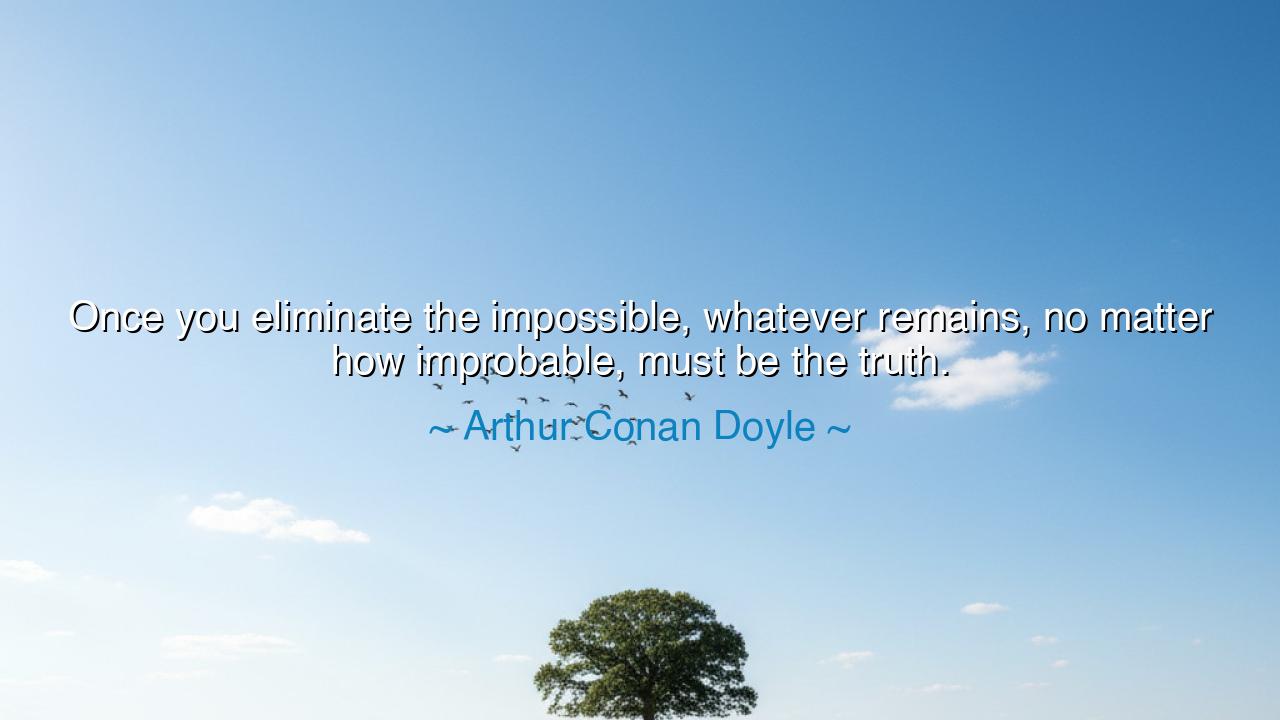
Once you eliminate the impossible, whatever remains, no matter
Once you eliminate the impossible, whatever remains, no matter how improbable, must be the truth.






Hear the immortal words of Arthur Conan Doyle, voiced through the mind of his great creation Sherlock Holmes: “Once you eliminate the impossible, whatever remains, no matter how improbable, must be the truth.” This is not only the law of a detective, but a principle for all seekers of wisdom. For truth is often hidden beneath confusion, illusion, and assumption. Men are quick to believe what flatters them, or cling to what feels safe, yet the path of reason demands discipline. One must strip away the impossible, even when it is beloved, and stand bravely before what remains—whether it be strange, unsettling, or beyond expectation.
The meaning of this saying is both rational and spiritual. It is rational in its method: when faced with mystery, remove what cannot be, and let logic guide you to what must be. It is spiritual in its demand: to accept truth even when it shakes your comfort, even when it defies your desires. The improbable, once revealed, is still reality, and to deny it is to live in darkness. Thus Conan Doyle gives us not merely a maxim for detectives, but a rule of life: courage before evidence, humility before reality.
The ancients spoke of this discipline long before Holmes. Aristotle sought causes by stripping away what could not explain a thing, until the true cause revealed itself. The Stoics, too, urged men to separate appearances from essence, to look unflinchingly at what remained when illusion was cast aside. What Doyle clothed in the garb of detective work is but the continuation of an eternal philosophy: the relentless pursuit of what is, beyond the veil of what we wish.
History shows us this principle at work in the discoveries of science. Consider Johannes Kepler, who sought to understand the paths of the planets. For years he tried circular orbits, for the ancients had declared the heavens must be perfect. But the truth would not yield. At last, he stripped away the impossible—perfect circles—and embraced the improbable: that planets moved in ellipses. It seemed ungainly, even disappointing, but it was truth. And from this act of intellectual courage arose the foundations of modern astronomy.
So too in the affairs of nations. Abraham Lincoln, in the chaos of civil war, was surrounded by a thousand voices offering explanations, excuses, and fantasies about slavery and union. Yet he eliminated the impossible: that a nation could be half slave and half free, that freedom could coexist forever with bondage. What remained, however improbable, was truth—that the nation must become wholly free or perish. It was a truth that demanded blood and sacrifice, yet it was the truth nonetheless, and by clinging to it, he preserved a nation.
The lesson for us is timeless: in our own lives, illusions surround us. We cling to hopes that cannot be, or excuses that flatter our weakness. But if we are brave enough to strip them away, what remains, however improbable, is the solid ground of truth. To live by this principle is to live unshaken, for one who accepts reality is stronger than one who hides from it.
Practical is this path: when faced with confusion, ask yourself what cannot possibly be true. Cast it aside, no matter how cherished. Then, look upon what remains. Accept it, even if it is uncomfortable, even if it demands change. Let this guide your decisions, your relationships, your work. For as Conan Doyle teaches, once you eliminate the impossible, whatever remains, no matter how improbable, must be the truth—and in truth lies both freedom and power.






TPthanh tuan pham
This quote makes me think about how we approach the search for truth in our daily lives. Sometimes, we jump to conclusions without fully exploring all possibilities. By applying this principle, we may be able to reach a more accurate understanding. But what if we overlook something crucial in the process of eliminating the impossible? How can we be certain that our elimination of the impossible is thorough enough to reveal the true answer?
DUNguyen ngoc diem uyen
Doyle’s idea makes me think about the role of skepticism in uncovering the truth. If we can rule out the impossible, then what we’re left with must be true. But isn’t there always room for uncertainty? Can we ever truly be sure that we’ve eliminated all the impossible explanations, especially in complex situations where new information is constantly emerging? How do we balance certainty and doubt in our search for truth?
YNHuynh Ngoc Yen Nhi
I’ve always found Doyle’s quote intriguing because it offers a logical way to reach the truth, yet it assumes that we can clearly identify the impossible. But how do we know when we’ve truly eliminated every possible explanation? What happens if our understanding of what is ‘impossible’ is limited or flawed? Could there be truths that lie outside of what we perceive as possible or probable?
PNphuc nguyen
This quote by Doyle really challenges the way we approach problem-solving. It’s as if he's suggesting that once we rule out all the impossible explanations, the remaining possibility—no matter how unlikely—must be the truth. But is that always the case? Can we truly eliminate the impossible with certainty, or do we sometimes miss details or nuances that make us overlook other explanations?